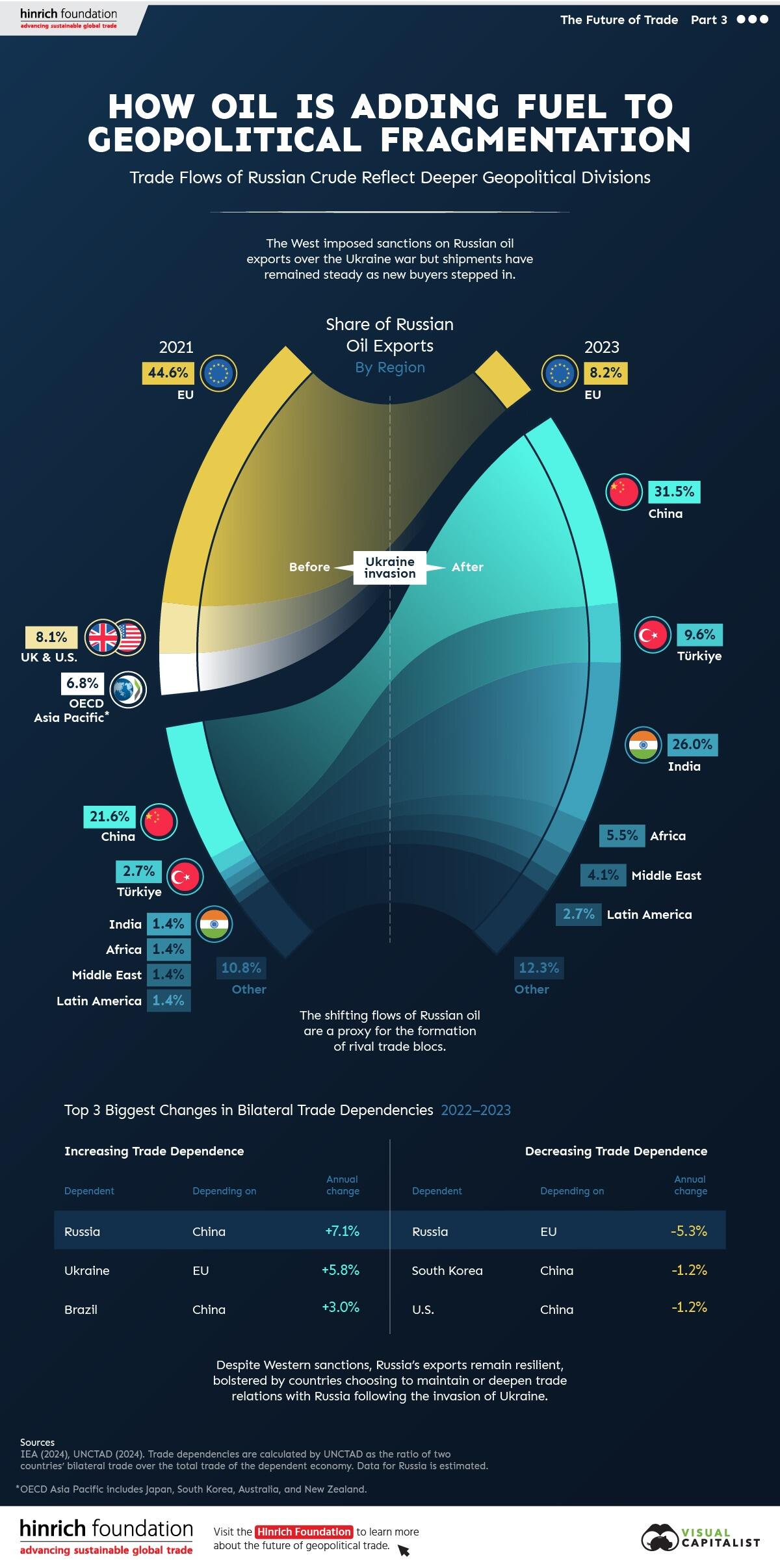Russia’s invasion of Ukraine in February 2022 led to severe bans or restrictions on Russian oil from the West. Meanwhile, other nations - including China, India, and Türkiye - opted to deepen trade ties with the country.
This graphic from the Hinrich Foundation is the final visualization in a three-part series covering the future of trade. Julia Wendling, via Visual Capitalist, provides visual context to the growing divide among countries shunning Russian oil versus those taking advantage of the excess supply.

Which Countries Have Decreased or Banned Russian Oil Imports?
This analysis uses data from the IEA’s February 2024 Oil Market Report on Russian oil exports from 2021 to 2023.
Following the invasion, both the U.S. and the UK enacted a complete ban on Russian crude. Imports dropped from 600,000 barrels per day (bpd) in 2021 to zero by late-2022.

Similarly, the EU, which has historically been more reliant on oil from Russia, dropped imports by over 80%, from 3.3 million bpd in 2021 to 600,000 bpd in 2023.
OECD Asia-Pacific—which includes Japan, South Korea, Australia, and New Zealand—also slashed their Russian oil imports.
Which Countries Have Increased Imports of Russian Oil?
The pullback in demand for Russian crude from the West created a buying opportunity for countries and regions that chose not to support Western sanctions.

India increased its imports of oil from Russia, by the largest amount from 2021 to 2023—up to 1.9 million bpd from only 100,000 bpd.
China, the biggest net importer, also saw a large uptick. The country boosted imports for Russian oil by over 40% over this timeframe. Türkiye increased imports of Russian crude by an additional 500,000 bpd.
Several other regions—such as Africa, the Middle East, and Latin America—saw slight upticks in imports.
Shifting Trade Dependencies
The dynamics present in the global crude market underscore broader trends in Russia’s trade relationships. Russia is becoming increasingly less economically reliant on the West and more reliant on China.
From 2022 to 2023, the largest upward shift in the UNCTAD’s bilateral trade dependency estimates was Russia’s increased reliance upon China (+7.1%).

Note: Trade dependencies are calculated by UNCTAD as the ratio of two countries’ bilateral trade over the total trade of the dependent economy.
In fact, China threw a lifeline to Russia in the aftermath of the Ukraine invasion. The Atlantic Council reported that Chinese exports to Russia have grown 121% since 2021, while exports to the rest of the world have increased by only 29% in the same period.
ADVERTISEMENT
In contrast, Russia also exhibited a large decrease in reliance on the EU (-5.3%). South Korea and the U.S. have made shifts to further distance themselves from China as geopolitical tensions continue to mount.

As the Russian oil market shows, geopolitical tensions have the potential to significantly impact trade. Though Russian crude exports remained steady amid the conflict, this necessitated a shift in its main trading partners.
By Zerohedge.com
More Top Reads From Oilprice.com:
- Microsoft: Russian and Chinese State Hackers Pose Growing Threat
- Chinese EV Makers Unfazed by Western Tariffs
- U.S. Automakers Race to Offset the Rise in Copper Prices



















The industrial terrorism by the U.S/UK/EU, and stealing Russia's foreign reserves will NOT go unpunished. The BRICS countries are trading very successful with Russia, and between themselves using their national currencies, and at the same time they are dumping the U.S Treasuries.